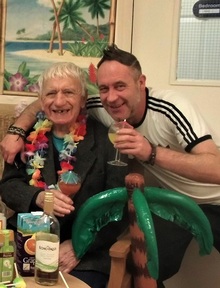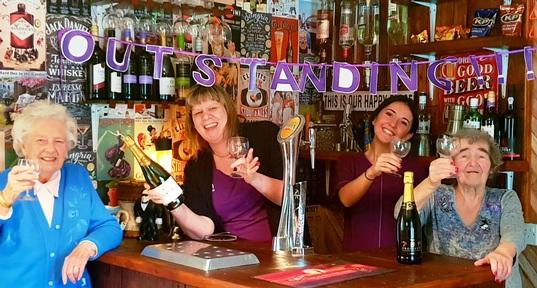Care home residents travel back in time with virtual reality reminiscence sessions
Care home residents can now travel to new places or back in time, without even leaving their armchairs, thanks to virtual reality, one of the latest technology innovations to enter the health and care sector.
Virtual Reality (VR) which is used in real life medical emergencies, during medical training and as a form of therapy, has been embraced by a number of care homes which are incorporating virtual reality into their activity and reminiscence sessions.
Residents can now access a whole new world and are able to visit beaches, the countryside, parks, towns and even experience what it is like in the Arctic.
A fully immersive experience
![]() Mr Stokeld helping a care home resident to participate in a virtual reality reminiscence session
Mr Stokeld helping a care home resident to participate in a virtual reality reminiscence session
and have been holding virtual reality reminiscence sessions in their homes as part of their regular reminiscence and activity sessions, working with North East based company, , which plans to expand across the UK.
's Dovecote Residential Care Home nursing home in Newcastle-upon-Tyne has found the virtual reality reminiscence sessions to be so effective it has invested in a headset.
Activities coordinator, Chelsey Jackson said: “We have found that by using the headsets, it has decreased anxiety in some residents along with being able to relax residents. The headsets are also used as a scenery change to those residents who are unable to go out due to illness.
“The reactions of the headsets when first trailed in the home was fairly mixed, with some residents embracing the technology while some residents were a little fearful. Once I promised it would not harm them and demonstrated it on myself, the residents were overjoyed to be transported to another world complete with sound."
Countrywide Care Homes’ Barnes Court Care Centre, Garden Hill Care Home and Earsdon Grange Care Home are just some of the group's homes that have already benefitted from sessions.
Participating residents wear a headset which gives them a 360-degree view of a location from a point-of-view perspective and is able to track head movements, making for a fully immersive experience.
![]() A still from South Shields in footage used in sessions held by 'reminiscience'
A still from South Shields in footage used in sessions held by 'reminiscience'
The view being experienced on the headset is displayed on a handheld tablet device to allow the home’s activities coordinator to chat with residents about what they’re seeing and experiencing.
Activities coordinator at Barnes Court, Julie Haram said: “The virtual reality reminiscence sessions have been fantastic. Using the goggles is a lot of fun and we’ve had staff and family members joining in with the sessions which has been great for bonding and provoking conversations.
“It’s also been very beneficial for our residents who don’t like to participate in group activities or struggle to communicate with others."
Earlier this year, Alzheimer’s Research UK developed an app to help give people an insight into what it is like to live with dementia. Similarly, Virtual Dementia Tours are helping to give care staff an insight into life with dementia by offering them an immersive dementia experience.
Smiling about the 'good old days'
Garden Hill Care Home, activities coordinator Sina Scott, has found the "virtual reality headsets have been very beneficial for our residents with limited mobility who aren’t able to visit places as it gives them a way to interact with the world and visit places they would otherwise be physically incapable of going to.
![]() 100-year-old Garden Hill Care Home resident Lily enjoying a virtual reality reminiscence session
100-year-old Garden Hill Care Home resident Lily enjoying a virtual reality reminiscence session
"So far sessions have been led by a representative from reminiscience but staff members here are going to be trained to use the system so that we can rent the headset for the whole day. That way everyone will have the opportunity to take part.”
Garden Hill Home manager Lindsay Donoghue-Flockhart added: “The reaction from the residents has been phenomenal. Even our residents who are unaccustomed with using modern technology have found it very accessible and easy to use. As well as chatting about the memories they re-lived, they also talked for hours afterwards about the technological aspects of the session, wondering how it was done. It was lovely to see them smile about the ‘good old days’.”
For centenarian Lily Burns, resident at Garden Hill Care Home, “the sessions have been wonderful. It’s very interesting to see the different places, it really is like being there in person. I would love to know how they do it. It’s amazing what you can do with technology these days.”
Newcastle University MSc graduates Jack Brinn and Ashley Stokeld, founders of reminiscience said: “We established reminiscience when we were first exposed to virtual reality and thought about the ways it could be used within the care sector to benefit those that perhaps it wasn’t intended to be used.
“The technology provides an immersive experience in another location which naturally fits with residents who find it difficult to explore different places. As some of the age ranges within certain care homes can be vast, trying a ‘one-fit-all approach’ with certain activities is difficult, however, the use of VR allows you to tailor content that can be specific to each resident.”
Tailored reminiscence content
Mr Brinn and Mr Stokeld conducted many focus and test groups before they approached care homes to see how VR would affect residents.
![]() Virtual reality reminiscence at Barnes Court Care Centre
Virtual reality reminiscence at Barnes Court Care Centre
Residents can participate in sessions on a one-to-one basis in their rooms or in small groups in communal area depending on their preference and where they feel most comfortable.
Mr Stokeld explained: “We ask residents if there are any particular places or activities they would like to see, consulting a library of footage that we have brought with us, including a wide variety of different options and therefore finding something that would be the most engaging and stimulating to them.
“When immersed in a particular location we start discussing with the resident about what they can see and how they remember a particular place, if there are any changes or any memories they may have. This can often lead to in-depth conversation about things that mean the most to the resident and can un-earth particular interests that can be built into the care plan.”
Helen McArdle Care’s homes Kirkwood Court Care Home and Redesdale Court Care Home are among the group's homes benefiting from these sessions.
Redesdale Court's manager, Michelle Jones, has found residents like to choose from periods or places in their lifetime that they would like to see again as it was so many years ago or how it is at present. "For this to happen they put on special glasses and are transported to their chosen period. With the 3D effect of virtual reality video, they are able to feel as though they are actually at that time and place and ‘in the moment’.
“Sessions contribute to their wellbeing and mood and enable them to live the moment in virtual reality that they wouldn’t be able to in reality," she said.
Increasing the quality of one-to-one interaction
![]() Garden Hill Care Home resident Alfie with Mr Brinn
Garden Hill Care Home resident Alfie with Mr Brinn
Mr Stokeld sees the “reminiscing aspect of VR as a way to increase the quality of one-to-one interaction and engagement that perhaps some other forms of activities may not be able to do.
He said: “Our ultimate goal is to be able to increase the standards of activity and therapy that take place within the care sector by utilising technology that doesn’t differentiate between different levels of ability and cognitive function and can be used by all.”
Latest Innovative Care News
 13-May-19
'Pink drink' brain cancer treatment rolled out across NHS in memory of Baroness Jowell
13-May-19
'Pink drink' brain cancer treatment rolled out across NHS in memory of Baroness Jowell
 25-Apr-19
Louis Tomlinson helps 83-year-old who lost wife to dementia complete bucket list
25-Apr-19
Louis Tomlinson helps 83-year-old who lost wife to dementia complete bucket list
 22-Mar-19
UK's top care home handyman takes residents to pub for pie and pint
22-Mar-19
UK's top care home handyman takes residents to pub for pie and pint
 12-Feb-19
Michael McIntyre's jokes tested to see if they stop elderly catching flu
12-Feb-19
Michael McIntyre's jokes tested to see if they stop elderly catching flu
 07-Jan-19
'We were lucky to find it': Family's delight as care home is rated Outstanding
07-Jan-19
'We were lucky to find it': Family's delight as care home is rated Outstanding